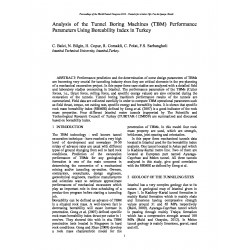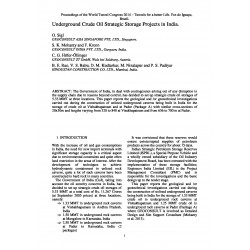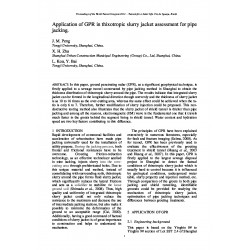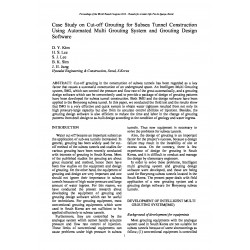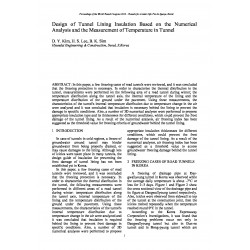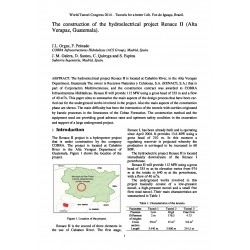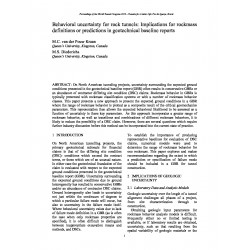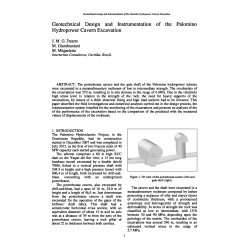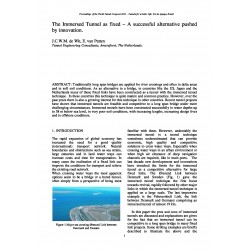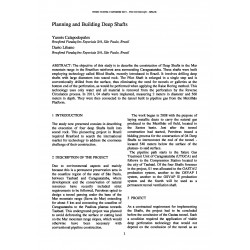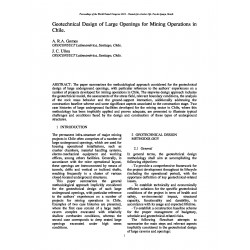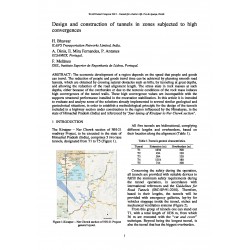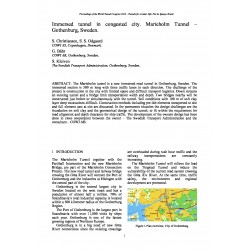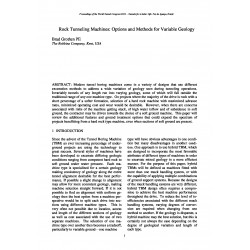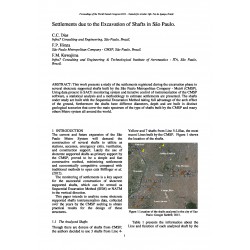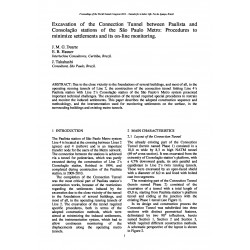No document
Search & filter
Search for a publication
Search & filter
World Tunnelling Congress
WTCThere are 1984 documents.
-
Analysis of the Tunnel Boring Machines (TBM) Performance Parameters Using Boreability Index in Turkey
Abstract: Performance prediction and the determination of some design parameters of TBMs are becoming very crucial for tunneling industry since they are critical elements in the pre-planning of a mechanical excavation project. In this paper three case studies are analyzed with a detailed field and laboratory studies concerning in Istanbul. The performance parameters of the TBMs (Cutter forces, i.e.,...
0,00 € -
Underground Crude Oil Strategic Storage Projects in India
Abstract: The Government of India, to deal with contingencies arising out of any disruption in the supply chain due to reasons beyond control, has decided to set up strategic crude oil storages of 5.33 MMT at three locations. This paper reports the geological and /or geotechnical investigations carried out during the construction of unlined underground caverns being built in India for the storage of...
0,00 € -
Application of GPR in thixotropic slurry jacket assessment for pipe jacking
Abstract: In this paper, ground penetrating radar (GPR), as a significant geophysical technique, is firstly applied to a sewage tunnel constructed by pipe jacking method in Shanghai to obtain the thickness distribution of thixotropic slurry around the pipe. The results indicate that integrated slurry jacket can be formed in the longitudinal direction though unevenly and the thickness of slurry jacket is...
0,00 € -
Case Study on Cut-off Grouting for Subsea Tunnel Construction Using Automated Multi Grouting System and Grouting...
Abstract: Cut-off grouting in the construction of subsea tunnels has been regarded as a key factor that causes a successful construction of an underground space. An Intelligent Multi Grouting system, IMG, which can control the pressure and flow rate of the grout automatically, and a grouting design software which can be conveniently used to provide a package of design of grouting patterns have been...
0,00 € -
Design of Tunnel Lining Insulation Based on the Numerical Analysis and the Measurement of Temperature in Tunnel
Abstract: In this paper, a few freezing cases of road tunnels were reviewed, and it was concluded that the freezing protection is necessary. In order to characterize the thermal distribution in the tunnel, measurements were performed on the following area of a road tunnel during winter; the temperature distribution along the tunnel axis, the internal temperature of the lining and the temperature...
0,00 € -
The construction of the hydroelectrical project Renace II (Alta Verapaz, Guatemala)
Abstract: The hydroelectrical project Renace II is located at Cahabón River, in the Alta Verapaz Department, Guatemala The owner is Recursos Naturales y Celulosas, S.A. (RENACE, S.A.) that is part of Corporación Multinversiones, and the construction contract was awarded to COBRA Infraestructuras Hidráulicas. Renace II will provide 112 MW using a gross head of 335 m and a flow of 40 m3/s. This paper aims...
0,00 € -
Behavioral uncertainty for rock tunnels: Implications for rockmass definitions or predictions in geotechnical...
Abstract: On North American tunneling projects, uncertainty surrounding the expected ground conditions presented in the geotechnical baseline report (GBR) often results in conservative GBRs or an abundance of contractor differing site condition (DSC) claims. Rockmass behavior in GBRs is typically presented with rockmass classification systems or with a number of rockmass behavior classes. This paper...
0,00 € -
Geotechnical Design and Instrumentation of the Palomino Hydropower Cavern Excavation
Abstract: The powerhouse cavern and the gate shaft of the Palomino hydropower scheme were excavated in a metasedimentary rockmass of low to intermediate strength. The overburden of the excavations was 270 m, resulting in in situ stresses in the range of 6 MPa. Due to the relatively high stress level in relation to the strength of the rock, the need for heavy supports of the excavations, by means of a...
0,00 € -
The Immersed Tunnel as fixed – A successful alternative pushed by innovation
Abstract: Traditionally long span bridges are applied for river crossings and often in delta areas and in soft soil conditions. As an alternative to a bridge, in countries like the US, Japan and the Netherlands many of these fixed links have been constructed as a tunnel with the immersed tunnel technique. In these countries this technique is quite mature and common practice. However, over the past years...
0,00 € -
Planning and Building Deep Shafts
Abstract: The objective of this study is to describe the construction of Deep Shafts in the Mar mountain range in the Brazilian rainforest area surrounding Caraguatatuba. These shafts were built employing technology called Blind Shafts, recently introduced in Brazil. It involves drilling deep shafts with large diameters into sound rock. The Pilot Shaft is enlarged in a single step and is conventionally...
0,00 € -
Geotechnical Design of Large Openings for Mining Operations in Chile
Abstract: The paper summarizes the methodological approach considered for the geotechnical design of large underground openings, with particular reference to the authors´ experiences on a number of projects developed for mining operations in Chile. The stepwise design approach includes the geotechnical model, the assessments of the stress field, relevant boundary conditions, the analysis of the rock mass...
0,00 € -
Design and construction of tunnels in zones subjected to high convergences
Abstract: The economic development of a region depends on the speed that people and goods can travel. The reduction of people and goods travel time can be achieved by planning smooth road layouts, which are obtained by crossing natural obstacles such as hills, by tunneling at great depths, and allowing the reduction of the road alignment length. The stress state in rock masses at such depths, either...
0,00 € -
Immersed tunnel in congested city. Marieholm Tunnel – Gothenburg, Sweden
Abstract: The Marieholm tunnel is a new immersed road tunnel in Gothenburg, Sweden. The immersed section is 500 m long with three traffic lanes in each direction. The challenge of the project is construction in the city with limited space and difficult transport logistics. Down streams an existing tunnel and a bridge limit transportation width and depth. Two bridges nearby will be constructed just before...
0,00 € -
Rock Tunneling Machines: Options and Methods for Variable Geology
Abstract: Modern tunnel boring machines come in a variety of designs that use different excavation methods to address a wide variation of geology seen during tunneling operations. Invariably tunnels of any length run into varying geology, some of which will fall outside the traditional range of any one machine type. On projects where the majority of the drive is rock with a short percentage of a softer...
0,00 € -
Settlements due to the Excavation of Shafts in São Paulo
Abstract: This work presents a study of the settlements registered during the excavation phase in several shotcrete supported shafts built by the São Paulo Metropolitan Company - Metrô (CMSP). Using data present in SACI: monitoring system and iterative control of instrumentation of the CMSP software, a statistical analysis and a methodology to estimate settlements are presented. The shafts under study...
0,00 € -
Excavation of the Connection Tunnel between Paulista and Consolação stations of the São Paulo Metro: Procedures to...
Abstract: Due to the close vicinity to the foundations of several buildings, and most of all, to the operating running tunnels of Line 2, the construction of the connection tunnel linking Line 4´s Paulista station with Line 2´s Consolação station of the São Paulo´s Metro system presented important technical challenges. The excavation of the tunnel required special procedures to restrain and monitor the...
0,00 €

